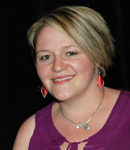

2013 Young Scholars: Rachel Walker

NSW
…it was not lost on us that the African continent is one of the most culturally, socially, economically and climatically diverse in the world.
Attending the joint conference of The Crawford Fund and the Australia Africa Research Forum “Mining, Agriculture and Development: Bread from stones” as a Young Crawford Scholar, has been a highlight of 2013. We heard from speakers on a range of topics that provided a scientific perspective on agriculture, mining, and economics, in addition to a social and cultural perspective of international development, government, corporate social responsibility and poverty alleviation. The perspective of various African nations was well balanced with Australia’s, and the hard questions were certainly not avoided. The opportunity to mingle with like-minded individuals at different stages of their careers was invaluable as well as inspiring to say the least.
Just a few hours after flying in I found myself listening to the Hon. Dr Florence Chenoweth, the Liberian minister for agriculture, giving her inspirational story of commitment to food security and sustainable agriculture, escaping war-torn Liberia, and pragmatic words of wisdom regarding gender equality in development – what a fantastic start to the conference!
The main day of the conference delivered an in depth look at the conflicts and concerns regarding the interrelations of the various facets of mining and agriculture, in both Africa and Australia. The speakers offered a wide range of subject material from varied perspectives, which gave conference attendees a scope of how multifaceted these topics are. I personally enjoyed hearing from economist Mr. Mario Pezzini, who provided an important perspective on the role that mining could potentially play on issues of poverty alleviation and development through economically efficient natural resource management and corporate social responsibility.
One of the keynote speakers was HE Festus Mogae, former President of Botswana, who gave an entertaining and informative presentation on the role of mining and agriculture in Africa, and offered achievable examples of collaboration between private mining corporations and government administration to ensure best practice and maximise development opportunities. I thought he summarized one of Africa’s major conundrums well by saying: ‘Africa is a continent of plenty, with an abundance of agricultural land and natural resources, yet there is enormous need and enormous poverty. In the midst of plenty, people are suffering’.
With representation from a number of African nations, and amid a variety of disciplines and expertise, many different opinions, backgrounds and perspectives were represented, and discussion seemed to take a necessary holistic approach that was both progressive and informative. Issues of economics, politics, society, culture, colonisation, science, education, poverty, land tenure, foreign aid, foreign investment, international corporate mining responsibilities, corruption and climate were all being addressed during table discussions. This diversity provided such a lively and high calibre discussion of hot topics where an interdisciplinary approach proved to be invaluable.
Whilst the role of agriculture and mining in the facilitation of poverty alleviation and development was addressed from various perspectives, it was not lost on us that the African continent is one of the most culturally, socially, economically and climatically diverse in the world. There is no one-size-fits-all solution, and the primary challenges of culturally and socially appropriate and beneficial change was at the forefront of discussion.
One of the highlights of this opportunity was meeting the other young scholars from both Africa and Australia. Hearing their thoughts and opinions, learning about their different fields of interest and future goals was both inspiring and encouraging. The conversations between us at the dinner table were just as invigorating and thought provoking as those had within the conference.
Becoming involved in development from an agricultural perspective is something that I had previously considered doing at some stage of my career, however attending the conference cemented my passion and has given me direction for focusing on this in the near future.